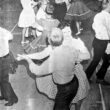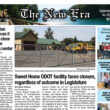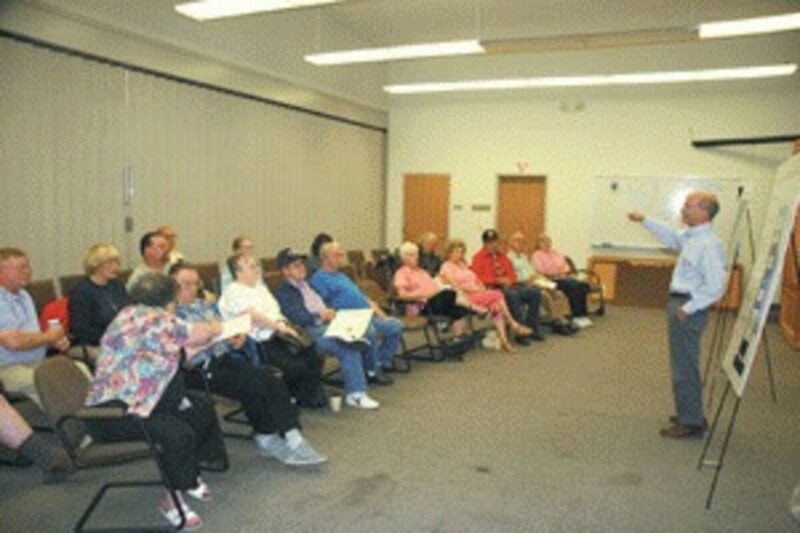Scott Swanson
Of The New Era
Congressman Peter DeFazio met Thursday, Aug. 24, with some 25 local citizens in a town hall meeting that covered a gamut of issues, from gas prices to illegal immigration.
The meeting at the Sweet Home Fire and Ambulance District headquarters, was one of several stops DeFazio made last week in the community as he swung through his district prior to the Nov. 7 election, in which he is running for re-election against Republican Jim Feldkamp. A Democrat based in Springfield, he has represented the Fourth District since 1986.
DeFazio opened the meeting by criticizing President Bush’s stated commitment to stay in Iraq for as long as it takes to stabilize that country.
“Ninety to 95 percent of the insurgency is a religious civil war,” DeFazio said, noting that there have been brief interludes of peace when the Iraqi government has cracked down on fighting. “They can control the violence if they really wanted to.”
He said he believes it is a mistake for the United States to commit to a long-term presence in Iraq.
“As long as we say we’ll stay forever if necessary…that’s the wrong message,” DeFazio said.
Another of the primary concerns he addressed is fuel prices, for which he has advocated regulation of the oil industry.
“People say it’s just market forces at work and there’s nothing we can do about it,” DeFazio said of the high prices at the pumps. “That’s not true.”
He said he recently attended a seminar at the James A. Baker III Institute for Public Policy at Rice University, named after President Reagan’s Secretary of State.
“These people are not left-wing,” he said.
He said analysts there have determined that crude oil prices should be at $100 a barrel for gas at the pump to cost $3 a gallon.
“Plain and simple, windfall profits and price gouging is what’s going on here,” he said. “We regulate virtually everything except three-quarters of the crude oil market.”
Another problem DeFazio cited is the lack of refineries – 55 have been shut down in the last 10 years due to mergers, he said.
He said he has sponsored a bill that would impose a windfall profits tax on oil producers and refiners that do not invest in new refineries. The bill, HR 3544, would also increase fuel efficiency standards and crack down on oil monopolies by imposing a moratorium on oil company mergers.
“Exxon-Mobil has $23 billion in excess cash they don’t know what to do with,” DeFazio said, adding that the corporation isn’t doing anything with the cash to bring down fuel prices.
He noted that a solution to high fuel prices is to develop alternative energy sources, such as research by an Oregon State University professor who is developing a process of mixing oil from vegetable matter and alcohol to produce biodiesel.
He said the U.S. needs to follow the example of Brazil, which decided during the 1980s to become energy-independent and has since achieved that goal by developing alternative energy sources.
He said that electric power currently being sold by the Bonneville Power Administration at surplus bargain rates, during the nighttime hours when demand for power is reduced, could be used to make hydrogen fuel cells.
“We can crack hydrogen to produce energy,” he said.
In response to questions from the audience, DeFazio addressed illegal immigration, saying that he disagrees with amnesty and guest worker programs advocated by the Bush Administration and a Senate bill.
He said big business has been the primary beneficiary and supporter of the current lack of enforcement by the administration – though the Clinton Administration didn’t do much better, he added.
He said a “very tough immigration bill” passed by the House last winter would make it easier for employers to determine whether prospective employees are legal residents and would severely penalize those who hire illegal aliens.
“The bill is based on the simple principle that you have to break the link” between jobs and illegal immigration, he said.
DeFazio cautioned attendees to remember that there are two categories of aliens in the United States – illegal and legal.
The latter, he said, are people who have played by the rules and waited patiently for the chance to immigrate and become citizens. Illegal immigrants are generally from “failed states” and are looking to make a living.
“We always have to distinguish between the two categories,” he said.
In response to concerns from the audience about lack of medical coverage, DeFazio said he advocates a universal health insurance program and regulation of the insurance industry, which, he noted is one of two industries (baseball is the other) that are exempt from antitrust laws. He made the same argument when asked about the problems Hurricane Katrina survivors are having with insurance companies.
Later, DeFazio said he’s spoken to “huge” crowds in some of the communities he’s visited – 150 people in Coos Bay, 100 in Brookings and Grants Pass.
“People are pretty aroused,” he said. “They generally don’t think things are going well.”
On one other topic, forestry, he said he has re-introduced a bill that would increase the federal timber harvest by allowing harvesting of second-growth stands in national forests.
“They need to be thinned,” he said, adding that the backlog of thinning in national forests could produce 400 million board feet of timber a year for 15 yearws.
“There are a lot of smaller logs the the mills want. This would put people to work.”




